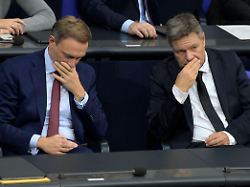Traffic light promise is shaky
Climate money is becoming increasingly unlikely
December 30, 2023, 8:57 a.m
The traffic light coalition actually wanted to use climate money to relieve the burden on people in the country – but heating and refueling are becoming more and more expensive. But there is no sign of the agreement in the coalition agreement anywhere. No wonder given the tight budget. Is it still coming?
It is becoming increasingly uncertain whether the federal government will actually introduce climate money to relieve rising fuel and heating costs. It was agreed in the coalition agreement, but given the tight budget it is unclear whether the federal government can even afford it. The Ministry of Finance is now saying that implementation is on schedule, but whether and how it will actually happen is questionable.
It was agreed that the payment route would be created during this electoral period, said State Secretary Katja Hessel. “The mechanism is scheduled to be available by 2025.” But that doesn’t mean that climate money will then be paid out. Politically, the structure of climate money has not yet been decided, said Hessel.
From a purely technical point of view, the federal government has the problem that it has not yet been able to transfer money directly to citizens’ accounts. To do this, the federal government must combine the tax identification number that everyone receives at birth with an account number. In addition, only a certain number of transfers are possible per day.
At least they want to make progress on the first problem: “It is expected that by the end of 2024, an associated IBAN will be saved for the tax identification number of all citizens who are willing to do so,” says the Ministry of Finance.
Money is earmarked for climate protection and chip factories
Hessel suggested a reform of the funding policy. “At the moment, all income from the CO2 price is earmarked for climate support measures or for subsidies such as funding chip factories,” she said. If you want to pay out climate money, the funding policy would have to be fundamentally changed.
SPD General Secretary Kevin Kühnert sees a hidden message in such statements. If a consequence of the Federal Constitutional Court’s budget ruling is that there will be no climate money for the FDP, “then they have to say that openly,” he recently warned in an interview with “Stuttgarter Zeitung” and “Stuttgarter Nachrichten”.
In the end, climate money will also be a question of the funds available. Lower Saxony’s Prime Minister Stephan Weil from the SPD told “Welt”: “I don’t know how this could be financed under the current conditions.” But it is more important than ever. SPD parliamentary group deputy Matthias Miersch also sees the scope for maneuver as a result of the Federal Constitutional Court’s budget ruling. The income from the CO2 price would first have to replace the now missing funds for funding programs and other measures for climate protection and the modernization of the economy, he told the Germany editorial network.
The CO2 price for all fossil energy sources such as heating oil, natural gas, gasoline and diesel has existed in Germany since 2021. The consumption of these raw materials is becoming more expensive, which is intended to contribute to climate protection. Most recently, in the struggle over the federal budget, the coalition agreed that the CO2 price should rise somewhat more on January 1st than previously planned.
Economics: Make sure you keep promises
The economist Veronika Grimm calls for climate money to be introduced before the next federal election. “Climate money should have been established from the start – before the increase in CO2 pricing,” said Grimm to the Düsseldorf “Rheinische Post”. “Then it would be crystal clear that increasing CO2 pricing is not a tax increase, but simply a steering instrument.” The federal government should “absolutely keep the promise of climate money, even if the climate money is now being introduced well after CO2 pricing,” Grimm continued.
Most recently, Economics Minister Robert Habeck from the Greens argued that citizens would be relieved because the state would cover the EEG levy on electricity prices. Almost all income from the CO2 price flows back to people.
According to consumer advocates, Habeck’s calculation doesn’t work. The total revenue from the CO2 price is significantly higher than the relief from the EEG levy, argues the Federal Association of Consumer Organizations (vzbv). Mathematically, every citizen would be entitled to climate money of 139 euros for the past three years. A family of four would have to receive 556 euros. Given Germany’s current population, the federal government would have to invest around 11.76 billion euros. Budget politicians argue that there is no such leeway in the budget for next year.
